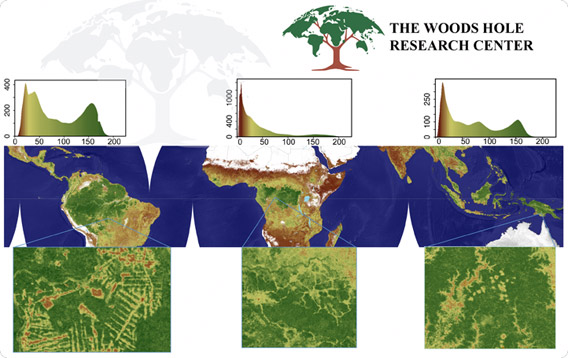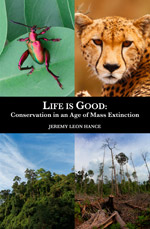Here mongabay.com provides a quick review of forest-related news for January 2012.
Energy and biofuels
January was an eventful month for the palm oil industry. Both the U.S. and the E.U. ruled that conventionally-produced palm oil-based biodiesel does not meet low carbon fuel standards due to emissions from deforestation and peatlands degradation. The decisions were immediately criticized by palm oil producers in Malaysia and Indonesia who hoped that renewable fuels mandates would boost demand for palm oil.
Coincidentally, researchers writing in Environmental Research Letters reported that industrial palm oil production in Peru is driving destruction of lowland rainforests.
Meanwhile regulators in California approved tough new rules for cars. The Advanced Clean Cars program aims to reduce carbon emissions and oil dependence through fuel efficiency. The program will require 15.4 percent of all cars sold in California to be zero or near-zero emissions by 2025.
Writing in Science, a team of researchers announced a new way to produce ethanol directly from seaweed, offering the potential to generate biofuels that don’t compete with terrestrial food production and won’t suck up scarce freshwater.

Biomass map. Courtesy of WHRC. Click here for a zoom-able version.
Rainforests
A comprehensive satellite-based assessment published in the journal Nature Climate Change estimated that the world’s tropical forests store some 229 billion tons of carbon in their vegetation — about 20 percent more than previously estimated. The findings could help improve the accuracy of reporting CO2 emissions reductions under the proposed REDD program, which aims to compensate tropical countries for cutting deforestation, forest degradation, and peatlands destruction.
Brazilian mining giant Vale won the dubious distinction of being named “the world’s worst corporation” for its involvement in the controversial Belo Monte dam (construction also began in January). Vale was selected after an online vote organized by the Public Eye Awards.
A review of scientific literature argued that selective logging of primary tropical forests is rarely sustainable ecologically or economically. The paper was published in journal Biological Conservation. A commentary by one of the authors in New Scientist warned that the world’s biggest trees are in decline.
Scientists in Nature warned that a combination of deforestation, forest degradation, and the effects of climate change are weakening the resilience of the Amazon rainforest ecosystem, potentially leading to loss of carbon storage and changes in rainfall patterns and river discharge. A cheerier study in the Proceedings of the National Academy of Science reported that a sharp drop in deforestation has been accompanied by an increase in food production in the Brazilian state of Mato Grosso. That research argued that policy interventions, combined with pressure from environmental groups, have encouraged agricultural expansion in already-deforested areas, rather than driving new forest clearing.
On the other side of the world, Indonesian President Susilo Bambang Yudhoyono made a surprise announcement that he would protect 45 percent of Kalimantan, the Indonesian part of Borneo. But environmentalists were immediately skeptical given that less than two-fifths of Kalimantan has healthy forest cover and that much of that is concessioned for logging and conversion to plantations. Meanwhile in Sumatra, a shocking protest by villagers pushed the Ministry of Forestry to probe a controversial logging concession on Padang Island off Sumatra. The villagers had sewn their mouths shut in the protest.
Climate
The Wall Street Journal faced a storm of protest after it published an op-ed attacking climate science, while turning down another op-ed explaining climate change and signed by 255 researchers with the U.S. National Academy of Sciences, which was eventually published in the journal Science. The op-ed last Friday first garnered attention because it was signed by 16 scientists, however other journalists have shown that most of these signatories are not climatologists, many are well-known deniers, and at least six have been tied to the fossil fuels industry.
NASA reported that 2011 was the ninth warmest year on record and the warmest La Niña yet. To date, nine of the world’s ten warmest years have occurred since 2000 according to data going back to 1880.
A study in Nature Climate Change found that CO2 emissions over the past two centuries have raised the acidity of the oceans to the highest levels in at least 21,000 years. Ocean acidification is viewed as a threat to many marine species, especially organisms that build structural materials out of calcium carbonate and the animals that feed upon them.
Biodiversity
Scientists announced that the title of the ‘world’s smallest vertebrate’ has been transfered from a fish to an amphibian after they discovered a tiny frog in Papua New Guinea.
In a rare bit of good news for rhinos, Nepal said it didn’t lose a single rhino to poaching in 2011. Nepal has an estimated 534 greater one-horned rhinos (Rhinoceros unicornis).
Shameless plug
And finally mongabay.com’s Jeremy Hance published his first book, Life is Good: Conservation in an Age of Mass Extinction, which includes essays on the challenge of mass extinction and the different ways conservationists are rising to meet it.

|
Most popular mongabay.com news articles – January 2012
- The year in review for rainforests [15,136]
- Invasion!: Burmese pythons decimate mammals in the Everglades [8,753]
- World deforestation rates and forest cover statistics, 2000-2005 [6,317]
- How to save the Amazon rainforest [6,269]
- Top 10 Environmental Stories of 2011 [5,814]
- Prehistoric Peruvians enjoyed popcorn [5,088]
- The biggest new species discoveries in 2011 [3,694]
- Borneo’s most elusive feline photographed at unexpected elevation [3,473]
- As Amazon deforestation falls, food production rises [3,391]
- ‘Lost world’ dominated by Yeti crabs discovered in the Antarctic deep [3,080]
- Future threats to the Amazon rainforest [3,054]
- Levi’s new forest policy excludes fiber from suppliers linked to deforestation [2,887]
- Camera traps snap first ever photo of Myanmar snub-nosed monkey [2,580]
- Mouths are sewn shut in protest against deforestation in Indonesia [2,306]
- Tiny lemur discovered in Madagascar forest [2,303]
- Economic slowdown leads to the pulping of Latvia’s forests [2,122]
- World’s most expensive tuna [2,093]
- Weird carnivorous flower devours worms underground [2,082]
- Photos: 46 new species found in little-explored Amazonian nation [2,063]
- Visiting the rainforest – a practical guide [2,023]
- Deforestation, climate change threaten the ecological resilience of the Amazon rainforest [1,968]
- New large horned viper discovered, but biologists keep location quiet [1,944]
- Featured video: NASA releases shocking 30 second film on climate [1,905]
- ‘Cute’ umbrella video of slow loris threatens primate [1,881]
- Big trees, like the old-growth forests they inhabit, are declining globally [1,843]
- Ecuador makes $116 million to not drill for oil in Amazon [1,737]
- Logging of primary rainforests not ecologically sustainable, argue scientists [1,733]
- How lemurs fight climate change [1,705]
- Our top nature pictures of 2011 [1,652]
- Biofuel breakthrough: kelp could power cars [1,649]
- New book series hopes to inspire research in world’s ‘hottest biodiversity hotspot’ [1,608]
- Geology has split the Amazon into two distinct forests [1,600]
- The dark side of new species discovery [1,597]
- Rainforests need massive finance, but REDD must be well-designed to succeed [1,586]
- Featured video: plight of orangutans highlighted with new rock song [1,546]
- Feared extinct, obscure monkey rediscovered in Borneo [1,537]
- Sumatran elephant population plunges; WWF calls for moratorium on deforestation [1,479]
- Dubai’s artificial islands have high environmental cost [1,477]
- Group releases photos of Borneo rainforest to be converted for palm plantations [1,460]
- Rainforests store 229 billion tons of carbon globally finds new ‘wall-to-wall’ carbon map [1,434]
- Seals, birds, and alpine plants suffer under climate change [1,420]
- Why is oil palm replacing tropical rainforests [1,393]
- New frog trumps miniscule fish for title of ‘world’s smallest vertebrate’ [1,368]
- Industrial palm oil production expands at expense of rainforests in Peru [1,355]
- Hugh Powell: birds lend invaluable insight into ecosystems [1,343]
- Giant snakes commonly attacked modern hunter-gatherers in Philippines [1,328]
- Obama rejects Keystone pipeline, but leaves door open for tar sands [1,277]
- World’s only pure blue lizard at risk of extinction [1,273]
- One company behind U.S.’s top three biggest greenhouse gas emitters [1,243]
- Eco-toilets help save hippos and birds in Kenya [1,208]
Italicized titles represent news articles posted during the month
Related articles